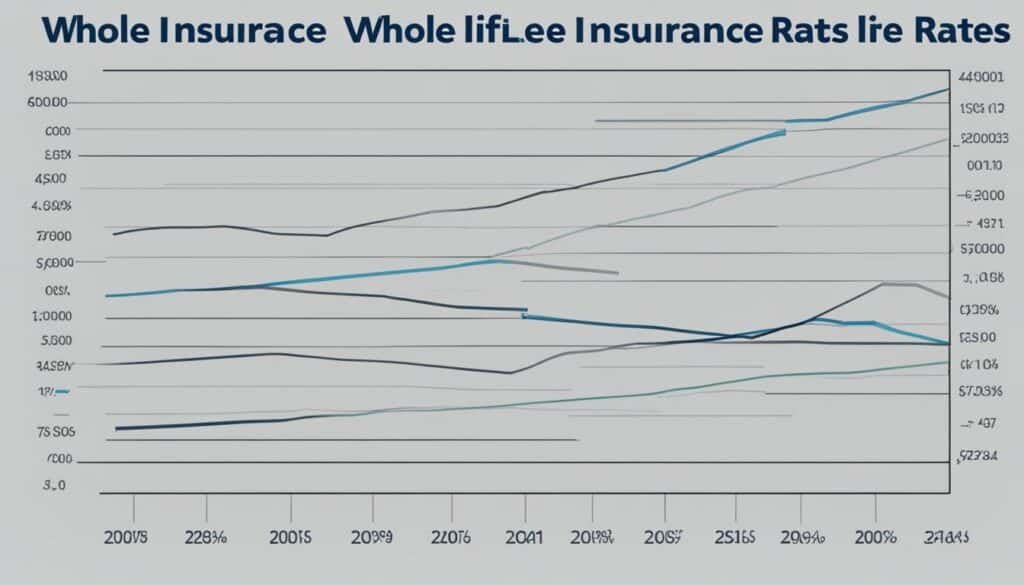Whole life insurance is a powerful financial tool that offers lifelong coverage and guaranteed cash value. It provides death benefit protection to keep your family financially secure in case of your passing, and it also allows you to leverage your money for competitive cash value growth. With whole life insurance, you can protect your family’s future and secure your own financial stability.
Key Takeaways:
- Whole life insurance provides lifelong coverage and guaranteed cash value.
- It offers death benefit protection to secure your family’s financial future.
- Whole life insurance allows you to grow your money through cash value accumulation.
- It provides financial stability and peace of mind for the long term.
- Consider comparing quotes from different companies to find the best whole life insurance policy for your needs.
Why Choose Whole Life Insurance?
Whole life insurance is a type of permanent life insurance that offers a range of benefits. It provides lifelong coverage, ensuring that your loved ones are financially protected even after you’re gone. But what sets whole life insurance apart is its unique ability to build cash value over time.
By paying your premiums, you not only secure a death benefit for your beneficiaries but also accumulate cash value within the policy. This cash value grows over time and can be utilized in various ways to meet your financial goals.
One of the key advantages of whole life insurance is its potential to build cash value steadily. This can be particularly advantageous for those seeking to supplement their retirement income or achieve specific financial milestones, such as purchasing a new home or starting a business.
The accumulated cash value can be accessed through policy loans or withdrawals, providing you with flexibility and financial security. Whether you need to cover unexpected expenses, fund your dream retirement lifestyle, or ensure liquidity for major purchases, whole life insurance offers the means to achieve those goals without having to rely on external financing.
Additionally, whole life insurance can serve as a valuable asset in your overall financial portfolio. It provides stability, especially during economic downturns, while offering potential tax advantages that can enhance your financial planning strategies.
With whole life insurance, you not only secure lifelong coverage and protection for your loved ones, but also gain the ability to build cash value and enjoy financial flexibility for a secure future.
Also Read :Protect Assets With Umbrella Insurance Coverage
The Benefits of Whole Life Insurance.

Whole life insurance offers several benefits that make it a valuable financial tool for individuals and families. Understanding these benefits can help you make an informed decision when choosing the right insurance policy for your needs.
Guaranteed Death Benefit
One of the key advantages of whole life insurance is the guaranteed death benefit it provides. This means that no matter when you pass away, your beneficiaries will receive a predetermined amount of money as a death benefit. This financial protection can help ensure that your loved ones are taken care of and can cover expenses such as funeral costs, outstanding debts, or ongoing living expenses.
Accumulated Cash Value
Unlike term life insurance, whole life insurance policies accumulate cash value over time. This is an additional savings component that grows tax-deferred based on a set interest rate or as a result of dividends received from the insurance company. The cash value can be accessed through policy loans or withdrawals, providing you with financial flexibility when you need it most.
Also Read : UIUC Study Abroad Adventures
Tax Consequences
While the cash value of a whole life insurance policy can be an attractive feature, it’s important to consider the potential tax consequences. When you access the cash value through policy loans or withdrawals, you may be subject to income tax on any gains or interest earned. It’s essential to consult with a tax advisor to understand the tax implications and make informed decisions regarding your policy.
Cash Surrender Value
In addition to the cash value, whole life insurance policies also have a cash surrender value. This is the amount of money you would receive if you decide to surrender or cancel your policy before its maturity. The cash surrender value can be used to supplement your income during down markets or to cover any unpaid policy loans. However, surrendering your policy may have financial consequences, so it’s important to carefully consider your options.
In conclusion, whole life insurance provides both financial protection and a savings component in the form of accumulated cash value. It offers a guaranteed death benefit to secure your loved ones’ future and provides you with the flexibility to access the cash value when needed. However, it’s crucial to be aware of the potential tax consequences and the impact of surrendering the policy. By understanding these benefits and considerations, you can make an educated decision that aligns with your financial goals.
Also Read : Low Income Personal Loan Options Explained
How Whole Life Insurance Works.

Whole life insurance is a comprehensive financial solution for individuals seeking lifelong coverage and various financial benefits. This type of insurance combines a death benefit with a cash value component, providing policyholders with security and flexibility.
When you purchase a whole life insurance policy, a portion of your premium is allocated towards cash value accumulation. This cash value grows over time, providing you with a valuable asset that can be accessed through policy loans or withdrawals.
The process of cash value accumulation works as follows:
- As you pay your premiums, a portion of the money is set aside and invested by the insurance company.
- Over time, the cash value of your policy increases, based on the performance of the underlying investments and the policy’s predetermined growth rate.
- This accumulated cash value belongs to you and can be used as a source of funds when needed.
Policy loans are one way to access the cash value of your whole life insurance policy. By borrowing against the cash value, you can utilize the funds for various purposes, such as paying for education expenses, purchasing a home, or covering medical bills. Policy loans usually have favorable interest rates and flexible repayment terms, making them a convenient option for policyholders.
Additionally, whole life insurance policies purchased from mutual insurance companies offer the potential to earn dividends. These dividends are a share of the company’s profits and are distributed to policyholders. Dividends can be reinvested to purchase additional coverage, accumulate more cash value, or taken in cash as surplus income.
Whole life insurance not only provides lifelong coverage and financial protection but also offers the opportunity for cash value accumulation, policy loans, and dividend earning potential. Understanding how whole life insurance works can help you make informed decisions about your financial future.
Also Read : Clearcover Insurance: Affordable Coverage Options
Whole Life Insurance vs Term Life Insurance.

When it comes to choosing the right life insurance policy, understanding the differences between whole life insurance and term life insurance is essential. These two insurance options offer distinct features and benefits tailored to different needs and priorities.
Permanent Policy vs. Temporary Coverage
One of the key differences between whole life insurance and term life insurance is the duration of coverage. Whole life insurance is a permanent policy that provides lifelong coverage, whereas term life insurance offers coverage for a specific term, typically 10, 20, or 30 years.
With whole life insurance, you can have peace of mind knowing that your policy will remain in effect throughout your entire life, as long as premiums are paid. In contrast, term life insurance provides coverage for a specific period, offering protection during a critical time, such as raising children or paying off a mortgage.
Also Read : State Farm Term Life Insurance: Secure Your Future
Addition Insurance Benefits
Another crucial difference lies in the additional benefits that whole life insurance offers. Whole life insurance policies accumulate cash value over time, allowing you to build a financial asset that can be used for various purposes.
This cash value can serve as a source of funds for emergency expenses, supplement your retirement income, or even be used to purchase additional coverage. Term life insurance, on the other hand, does not accumulate cash value.
Value and Death Benefit
Whole life insurance provides both a cash value and a death benefit, making it a comprehensive financial planning tool. The death benefit ensures that your loved ones are financially protected in the event of your passing, providing a tax-free payout that can help cover funeral costs, outstanding debts, or provide income replacement.
Term life insurance, on the other hand, only provides a death benefit, making it a more affordable option for those seeking pure protection for a specific period.
Comparison Table: Whole Life Insurance vs Term Life Insurance
| Whole Life Insurance | Term Life Insurance | |
|---|---|---|
| Duration | Provides coverage for your entire life | Provides coverage for a specific term (e.g., 10, 20, or 30 years) |
| Additional Benefits | Builds cash value over time that can be used for various purposes | Does not accumulate cash value |
| Value | Provides both a cash value and a death benefit | Provides only a death benefit |
How Much Does Whole Life Insurance Cost?

The cost of whole life insurance can vary depending on several factors such as age, health, and coverage amount. While whole life insurance premiums may be higher than those of term life insurance, it offers the added benefit of lifelong coverage and cash value accumulation. It’s important to compare quotes from different insurance companies to ensure you are getting the best rates for your coverage needs.
The cost of whole life insurance is influenced by various factors. These include age, health, and the desired coverage amount. Younger individuals with good health and lower coverage amounts generally pay lower premiums compared to older individuals or those with pre-existing medical conditions. Additionally, the cash value component of whole life insurance can contribute to the higher cost as it provides a savings element along with the death benefit.
To illustrate the range of whole life insurance rates, here’s a comparison table of quotes from reputable insurance companies:
| Insurance Company | Age | Health Rating | Coverage Amount | Monthly Premium |
|---|---|---|---|---|
| Company A | 35 | Excellent | $500,000 | $200 |
| Company B | 50 | Good | $1,000,000 | $500 |
| Company C | 45 | Fair | $250,000 | $150 |
Please note that the table above is for illustrative purposes only and the actual rates may vary based on individual circumstances. It’s advisable to request a personalized quote from each insurance company to get accurate pricing information.
Whole Life Insurance Policy Options.
When it comes to whole life insurance, there are several policy options available to cater to your specific needs and financial goals. One key aspect to consider is the premium-paying period, which can have an impact on the accumulation of the policy’s cash value. By choosing a policy with a shorter premium-paying period, you can accelerate the growth of the cash value, giving you more flexibility and options down the line.
The cash value of a whole life insurance policy serves as a valuable asset that can be utilized for various purposes. One option is to use the cash value to purchase additional coverage, allowing you to enhance your policy’s benefits and secure even greater financial protection. Another option is to tap into the policy’s cash value to supplement your income during retirement. This can provide you with a source of funds that can help maintain your lifestyle and cover unexpected expenses.
It’s important to carefully review all the policy options available to you before making a decision. Assess your financial goals and needs to determine which policy aligns best with your requirements. Consider factors such as the premium-paying period, the projected growth of the cash value, and the potential benefits of each policy option. By selecting the right whole life insurance policy, you can enjoy the lifelong coverage and maximize the benefits provided by your policy’s cash value.
| Policy Options | Description |
|---|---|
| Specific Premium-Paying Period | A policy option that allows you to choose a shorter premium-paying period to accelerate the accumulation of the policy’s cash value. |
| Additional Coverage | Utilize the cash value of your policy to purchase additional coverage, increasing the death benefit and providing extra financial protection. |
| Income Supplement during Retirement | Access the cash value of your policy to supplement your income during retirement, providing a source of funds for unexpected expenses and maintaining your standard of living. |
Getting a Whole Life Insurance Quote.
When it comes to securing the right whole life insurance policy, it’s essential to start with a comprehensive quote that suits your needs. Luckily, there are several ways to obtain a whole life insurance quote, ensuring you choose the best option for you and your loved ones.
To request a whole life insurance quote, you have two primary options:
- Contacting Insurance Companies Directly: Reach out to reputable insurance companies and speak with their representatives. They can guide you through the process and provide personalized quotes based on your unique circumstances. Be sure to gather quotes from multiple companies to compare coverage options and costs.
- Using Online Tools to Compare: Take advantage of the convenience and efficiency provided by online tools that allow you to compare different whole life insurance options. These tools typically require you to provide some basic information, such as age, health history, and desired coverage amount. They will then generate quotes from various insurance providers, allowing you to evaluate and select the best-suited whole life insurance policy for your needs.
When obtaining a whole life insurance quote, it’s important to consider several factors that can impact your decision:
- Coverage Amount: Determine the amount of coverage you require to protect your family’s financial well-being in the event of your passing. Consider factors such as outstanding debts, mortgage or rent, educational expenses, and ongoing living costs.
- Premium Costs: Assess the premiums associated with each whole life insurance policy being quoted. Ensure that the premium amount aligns with your budget and doesn’t impose a financial burden.
- Financial Strength of the Insurance Company: Research the stability and financial strength of the insurance companies providing the quotes. It’s essential to choose a reputable and reliable company that will be able to fulfill its financial obligations and provide peace of mind.
Comparing quotes from different companies allows you to evaluate various whole life insurance options, ensuring you select the policy that offers the coverage and benefits you need for a secure financial future.
Remember, obtaining a whole life insurance quote is the first step towards securing lifelong coverage and building financial protection for your family’s future.
Also Read : Money In The Bank: Understanding Deductible Insurance Can Save You Thousands
Conclusion.
In conclusion, whole life insurance offers a comprehensive solution for individuals seeking lifelong coverage and financial protection. With its guaranteed death benefit and cash value accumulation, this type of insurance provides peace of mind knowing that your loved ones will be financially secure upon your passing. Moreover, whole life insurance can also serve as a valuable asset for retirement planning or funding major expenses.
By securing a whole life insurance policy, you not only ensure the financial stability of your family but also have the flexibility to access cash value if needed. This cash value can be used to supplement your retirement income or address unforeseen financial challenges, providing you with a safety net and additional financial support.
With its multitude of benefits and lifelong coverage, whole life insurance stands as a reliable and dependable option for individuals seeking a comprehensive insurance solution. Whether it’s protecting your family’s financial future, leveraging cash value growth, or achieving peace of mind, whole life insurance offers a robust foundation for achieving your financial goals and ensuring long-term security.
FAQs
Q: What is whole life insurance?
A: Whole life insurance is a type of permanent life insurance that provides coverage for the entire life of the insured, as long as premiums are paid.
Q: Why should I consider whole life insurance?
A: Whole life insurance offers not only a death benefit but also a cash value component that grows over time, providing a source of savings and flexibility.
Q: How does whole life insurance differ from term life insurance?
A: While term life insurance provides coverage for a specific period, typically 10, 20, or 30 years, whole life insurance offers coverage for the entire lifetime of the insured.
Q: What are some benefits of whole life insurance?
A: Whole life insurance can help with estate planning, provide a source of tax-deferred savings, and offer peace of mind knowing that coverage will last throughout your lifetime.
Q: Is whole life insurance more expensive than term life insurance?
A: Yes, whole life insurance tends to be more expensive than term life insurance due to its permanent coverage and cash value component.
Q: How does the cash value of a whole life policy work?
A: The cash value of a whole life policy grows over time through contributions and dividends, which can be accessed through loans or withdrawals during the insured’s lifetime.
Q: What factors should I consider when purchasing a whole life insurance policy?
A: When purchasing a whole life insurance policy, consider the premium cost, cash value growth potential, financial strength of the life insurance company, and how it aligns with your long-term financial goals.
Source Links
- https://www.newyorklife.com/articles/why-whole-life
- https://www.forbes.com/advisor/life-insurance/whole-life-insurance/
- https://www.newyorklife.com/articles/what-is-whole-life-insurance




